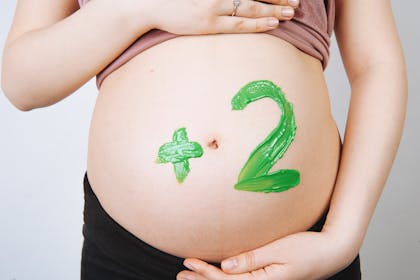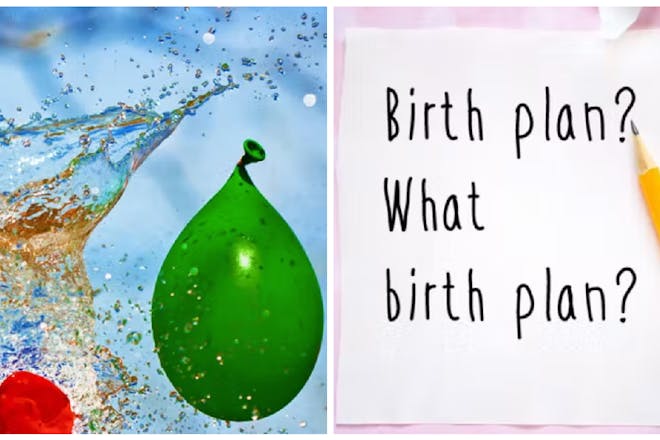What to expect when you're pregnant with twins

This page contains affiliate links, which means we may earn a small amount of money if a reader clicks through and makes a purchase. All our articles and reviews are written independently by the Netmums editorial team.
Having one baby can be daunting enough – so what happens when you're expecting two at the same time? From how you might be feeling to what to expect from your antenatal care, here's what to expect when you're pregnant with twins.
You may have an inkling that you're expecting twins or perhaps you already know you are (and can't quite believe it) – either way, HUGE congratulations!
Whether you're excited, petrified, incredibly anxious (or all three), it's perfectly natural to have mixed emotions. Those pesky pregnancy hormones won't help matters, either.
The good news is that there's tons of help, advice and support out there these days for mums expecting twins.
FREE NEWBORN NAPPIES
After all, numbers of twin pregnancies have jumped considerably over the last 30 years thanks to IVF treatment and older mums (which increases your risk of having more than once baby.)
Nearly 12,000 sets of twins were born in the UK in 2016 (compared to just over 7,500 in 1985), reports the Multiple Births Association.
And figures from the Office for National Statistics (ONS) reveal that there was one set of twins for every 63 live births in 2014 (compared to one in 100 in 1980) – so you're definitely not alone!
But while the news sinks in, read on to find out everything you need to know about being pregnant with twins. It should (hopefully) ease some of your concerns and help prepare you for a very exciting road ahead ...

How will I know I'm expecting twins?
Perhaps (non-identical) twins run in your family or you've had IVF treatment (which increases your chance of having twins). Maybe you just have a feeling ...
Although you may suspect you're carrying twins, the only way to find out for sure will be at your first scan.
According to the Twins Trust:
'A multiple pregnancy may be suspected from the size of the abdomen (being large for dates) or severe morning sickness, and is usually confirmed by an ultrasound scan.'
Will I feel different?
As above, you may feel particularly large during your pregnancy or more sick. However, if you've not been pregnant before this will just be normal to you as you've nothing to compare it to.
You may also feel particularly anxious during your pregnancy.
This is totally understandable and it's important to talk to your midwife, partner and other support groups to help ease any concerns.
Chatting to other mums in our forum can be really helpful, too.
Will I gain more weight?
You'll gain more weight than if you were carrying one baby but there's no definitive answer as to how much you'll put on.
You'll feel big and uncomfortable in your third trimester but remember that you'll most likely deliver the babies at 37 weeks, so you won't be pregnant for as long as you would be with one baby.
What exactly are twins?
We all know that twins means two babies BUT there are actually three different types of twins.
Your midwife or specialist will be able to explain this to you at your appointments but in a nutshell it comes down to whether two eggs were fertilised around the same time or whether one egg was fertilised and then split into two (babies).
The NHS explains the three different types of twins as follows:
- dichorionic diamniotic (DCDA) twins – each has their own separate placenta with its own separate inner membrane (amnion) and outer membrane (chorion)
- monochorionic diamniotic (MCDA) twins – share a single placenta with a single outer membrane and two inner membranes
- monochorionic monoamniotic (MCMA) twins – share both the inner and outer membranes.
Your midwife and sonographer will want to pinpoint (from a scan) which yours are by looking closely at whether the babies share a placenta or have their own.
Once they know what's called their 'chorionicity' they can map out your antenatal care in the best possible way for your babies.
This also helps to work out the chances of them being identical or non-identical.
As a rule of thumb:
- Twins sharing a placenta will usually be identical and therefore be the same sex.
- If you're having a boy and girl then you'll know that they're non-identical twins.
- Twins not sharing a placenta are usually non-identical although there is a possibility they could be identical (if they're the same sex). However, it's only possible to determine this with genetic test once they're born.
Twins Trust reports that:
'Generally about one-third of multiples are identical, and two-thirds are non-identical.'
How will my antenatal appointments differ with twins?
You'll have your first scan at around 11 weeks, which is likely to be when you first discover you're carrying twins.
At this appointment you'll have some further tests to establish their 'chorionicity'. This means finding out whether the twins are sharing a placenta and what type of twins you're carrying (as mentioned above).
For future antenatal care, you'll be given a 'core' team of experts to look after you during your pregnancy.
According to official healthcare (NICE) guidelines, you should be assigned:
'A core team of named specialist obstetricians, specialist midwives and ultrasonographers, all of whom have experience and knowledge of managing twin and triplet pregnancies.'
You'll also be treated as 'high risk' throughout your pregnancy, which sounds scarier than it's meant to, explains Twins Trust:
'The label of ‘high risk’ does not mean that you will experience complications, only that doctors need to monitor you more carefully.
'Many mothers find this extra level of antenatal care reassuring as it gives them a chance to ask questions and discuss how their pregnancy is progressing.'
You'll have at least two additional antenatal appointments at 16 weeks and 34 weeks. Plus, you'll meet with your obstetrician at least twice before having the babies.
You'll have the same scans offered to single pregnancies. These are:
- nuchal translucency scan at around 11-13 weeks
- anomaly scan at around 18-20 weeks.
However, with twins, you'll have extra scans, particularly throughout your third trimester.
You may even require regular fortnightly scans from as early as 16 weeks but this decision will depend on:
- whether the babies share a placenta, or not
- pregnancy complications that arise
- hospital procedure.
Many mums-to-be find these extra scans reassuring, keeping a close eye on your baby's growth and development as the pregnancy progresses.
Are there specific problems to watch out for in a twin pregnancy?
Sadly the risk of complications does increase slightly when you're carrying more than one baby.
Pregnancy complications to watch out for include:
- anaemia
- pre-eclampsia
- gestational diabetes
- intrahepatic cholestasis of pregnancy (ICP) – a liver condition
- bleeding (one in four multiple pregnancies will have some vaginal bleeding but always get checked out)
However, when you're pregnant with more than one baby, you're also at risk of the following complications:
- twin to twin transfusion syndrome (TTTS) – this affects roughly 1 in 7 pregnancies with twins where the placenta is shared and one baby doesn't get enough blood supply.
You'll be closely monitored throughout your pregnancy for evidence of TTTS. - growth restriction – more common in twin and multiple pregnancies, this is where the placenta can't sustain the babies' growth and development. It will be detected in scans and you may need to deliver early as a result.
Luckily, despite being in a 'high risk' category, Twins Trust reports that most mothers have healthy multiple pregnancies.
Giving birth to twins: what are my choices?
As regards where you give birth, your midwife will urge you to have the babies at hospital (as opposed to a home birth). This is because there's a higher risk of complications and a higher chance you'll need expert after care once you've given birth.
You'll also be advised to have the babies at or before 37 weeks to reduce the risk of complications at birth.
In terms of how you'll give birth, you'll still have the same two choices as if it were a single pregnancy. These are:
- natural vaginal birth
- C-section
The NHS estimates 'around 40% of mums carrying twins have a natural birth'.
It adds that:
'In the UK, more than half of twins and almost all triplets are delivered by caesarean.'
There's also a slim (5%) chance that you may deliver the first twin vaginally and then need a caesarean section to deliver the second twin.
If you do choose a vaginal birth you'll be recommended to have an epidural.
According to the NHS, 'if there are any problems, it's easier for your antenatal team to deliver your babies quickly if you've already got an epidural in place.'
You'll also have a bigger team in place ready to assist with the birth of two babies. This is likely to include:
- two midwives
- one obstetrician
- two paediatricians.
Help! I'm expecting twins ...
Whether you have a whole host of questions or a head load of confusion, these questions should help. Produced by Twins Trust, make a note of them (and any other questions you may have) and be ready to get some answers at your antenatal appointments.
Getting some answers should help take the edge of any anxiety – and stop you panicking, too ...
1. What is the hospital procedure for multiple births?
2. How will my antenatal care be arranged?
3. Who will be there for the birth of my babies?
4. What antenatal test will I be having (and what risks do they carry?)
5. What type of foods should I be eating?
6. Which vaccinations should I be having?
7. When should I stop travelling?
8. Does the hospital offer any multiple-specific antenatal classes?
9. What level of neonatal care is available?
10. Will there be advice on how to feed my babies? Ie midwives or other specialist staff to support mothers of multiples with breastfeeding?
11. Who should I contact if I have questions or would like advice outside of my check-ups?
Where can I get support with my twin pregnancy?
Twinline - run by Twins Trust, Twinline is open everyday from 10am to 1pm and from 7pm to 10pm on 0800 138 0509 or you can email asktwinline@twinstrust.org
The Multiple Births Foundation – founded in 1988 it has become a national and international authority on multiple births.
NCT – find out about antenatal classes for twins and multiples here.
BLISS – support for babies born prematurely.
And of course you can chat to other mums carrying two or more babies, in our chat forum below ...




